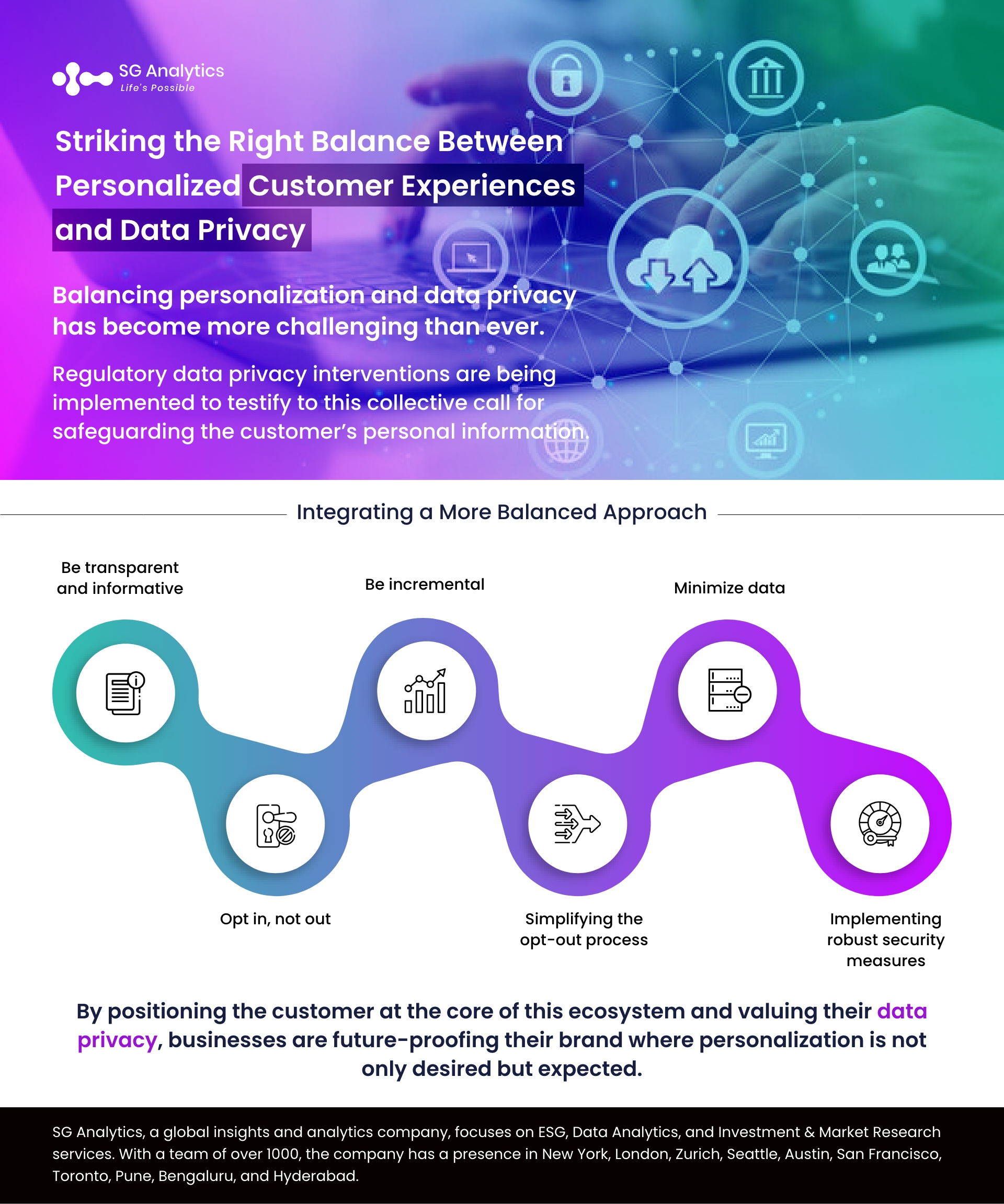Today's age of digital duality is all about incorporating measures to secure customer data. On the one hand, organizations are integrating frameworks to secure their customer base that actively desires personalized services from the brands. While on the other hand, they are slowly losing trust when it comes to companies using and protecting their data responsibly.
Data Privacy Concerns in Today's Digital Age
In the ever-evolving digital world driven by customer experience, personalization is becoming crucial for businesses looking to satisfy the modern consumer. The age-old adage "the customer is king" is now being replaced by a new maxim: "Treat the customer as an individual."
Today, with every click, there is a data footprint left behind. In the pursuit of customer experience personalization, organizations are accumulating vast amounts of personal data, ranging from browsing history to purchase preferences. Misusing this data, or even the perception, will tarnish a brand's reputation irrevocably.
In recent years, there has been a surge in data breaches related to personal data. These events, along with growing awareness about data privacy rights, have alerted consumers. A recent study highlighted that almost 79% of consumers worry about how a business handles their data.
Yet, this progression towards offering ultra-personalized experiences raises critical questions such as - How can businesses personalize customer experience while respecting the realm of data privacy?
Read more: How are Brands Breaking Through the Digital Clutter to Increase Customer Retention

The Appeal for Personalization
At the very core, personalization presents a basic human need: the desire to be recognized and valued. When a brand sends personalized recommendations and offers tailored discounts, it appeals to this inherent need. Research has shown that personalization is likely to lead to better conversion rates as well as enhanced customer loyalty.
Personalization renders something that is relevant to the user, and they can relate to it. In this digital world, it is very important to offer solutions that are personalized as well as relevant to the consumers. By connecting and resonating with their values, businesses can foster a successful relationship. However, establishing the right connection between personalization and privacy is intricate. And modern customers present a fascinating paradox.
Striking The Right Balance
In today's increasingly restrictive and fraught environment of regulation, balancing personalization and data privacy has become more challenging than ever. However, by going back to basics and building experiences that resonate with people, businesses can effectively navigate through the landscape.
The connection between customer experience personalization and data privacy is intricate and woven into the expectations of modern customers. They are passionately championing the growing need for data privacy, provoking heated debates on data protection. Regulatory data privacy interventions such as GDPR and CCPA are being implemented to testify to this collective call for safeguarding the customer's personal information. However, the same consumers freely share details of their lives, ranging from daily activities to pivotal life events on social platforms.
Read more: Trends 2023: Top Customer Experience (CX) Trends You Don't Want to Miss
This dichotomy is symbolic of today's contemporary digital era. And businesses are dealing with this paradox by following some rules.

Integrating a More Balanced Approach
1. Be transparent and informative. By clearly communicating with the customers about how their data will be used, businesses can establish transparent practices to foster trust, and consumers will be more likely to share their information when they understand the purpose and benefits behind it.
2. Opt in, not out. Instead of making personalization the default, businesses can offer customers the choice to opt in. This will empower the customers, ensuring they feel in control of their data.
3. Being incremental. Businesses can develop a strategy that enables them to gather more data as they go. Customers are savvy and will understand when a brand is using their data wisely, thereby fostering a sense of trust.
4. Simplifying the opt-out process. By frequently introducing programs to opt-out as an option or making it a multistep procedure, businesses can ensure that willing customers can exit with ease.
5. Minimize data. While it is tempting for brands to collect vast amounts of data, they must maintain clarity on which data is collected and its intended use.
6. Implementing robust security measures will ensure that the collected data is protected with the best security measures. With regular audits, end-to-end encryption, and multifactor authentication, businesses can further safeguard consumer data.
Read more: Unleashing Innovation: Crafting Customer-Centric Strategy for Business Transformation
Transparency has become the cornerstone of a balanced approach to data privacy and customer experience personalization. There is a growing need for businesses to clearly communicate customer data collection practices along with how customer data is being used and what benefits customers can receive in return. Marketers have to obtain explicit consent for data collection while ensuring that the customers understand as well as have control over their personal data. Businesses can only lay a solid foundation for personalized experiences by building trust through transparency and customer consent.
At the same time, protecting customer data is also paramount. By enforcing robust security measures, sensitive information can be safeguarded from unauthorized access or breaches. However, this requires the utilization of encryption, robust authentication protocols, and regular security audits. Owing to this, businesses are prioritizing data protection as a critical part of their privacy and personalization strategy.

To balance personalization and privacy, businesses are further leveraging anonymized and aggregated data. By analyzing trends, patterns, and behavior, businesses are focusing on extracting insights and personalizing experiences while maintaining customer anonymity and privacy.
While striking a balance between data privacy and personalization is not an easy task, it is critical for building trust and delivering meaningful experiences. By prioritizing transparency, safeguarding customer data, offering privacy controls, and minimizing data collection, businesses can create personalized experiences while respecting privacy boundaries.
Read more: Top Customer Retention Strategies for Businesses in 2023
The Future of Personalization and Data Privacy
The confluence of personalization and data privacy is not a zero-sum game. With a proactive approach, businesses are incorporating and providing unparalleled personalized customer experiences while upholding data privacy standards. Data privacy regulations, including GDPR and CCPA, are continuing to shape the customer experience personalization landscape. Rather than viewing these regulations as hurdles, businesses are embracing them as new opportunities to create deeper and trust-filled customer relationships.
Moreover, the evolution of technologies like machine learning and artificial intelligence is further equipping companies to develop frameworks that offer personalized experiences without accessing personal data. By positioning the customer at the core of this ecosystem and valuing their data privacy, businesses are future-proofing their brand where personalization is not only desired but expected. Anonymized data and privacy tools are further promising a future where personalization and data privacy will coexist harmoniously.

While privacy and personalization are not exclusive, they coexist to create exceptional customer experiences that value individual boundaries and preferences in today's customer-centric market.
SG Analytics, recognized by the Financial Times as one of APAC's fastest-growing firms, is a prominent insights and analytics company specializing in data-centric research and contextual analytics. Operating globally across the US, UK, Poland, Switzerland, and India, we expertly guide data from inception to transform it into invaluable insights using our knowledge-driven ecosystem, results-focused solutions, and advanced technology platform. Our distinguished clientele, including Fortune 500 giants, attests to our mastery of harnessing data with purpose, merging content and context to overcome business challenges. With our Brand Promise of "Life's Possible," we consistently deliver enduring value, ensuring the utmost client delight.
A leading enterprise in Customer Analytics, SG Analytics focuses on leveraging cutting-edge technologies and methods to provide cutting-edge customer analytics solutions and retain your customers by preventing churn-inducing customer behaviors. Contact us today to make critical data-driven decisions and develop more effective customer engagement initiatives, leading to happier customers.
About SG Analytics
SG Analytics is an industry-leading global insights and analytics firm providing data-centric research and contextual analytics services to its clients, including Fortune 500 companies, across BFSI, Technology, Media & Entertainment, and Healthcare sectors. Established in 2007, SG Analytics is a Great Place to Work® (GPTW) certified company and has a team of over 1100 employees and has presence across the U.S.A, the U.K., Switzerland, Canada, and India.
Apart from being recognized by reputed firms such as Analytics India Magazine, Everest Group, and ISG, SG Analytics has been recently awarded as the top ESG consultancy of the year 2022 and Idea Awards 2023 by Entrepreneur India in the “Best Use of Data” category.









